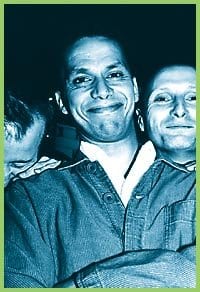Jacques Martineau and Olivier Ducastel have got to be the sweetest French, gay, filmmaking couple you are ever going to meet.
That’s hardly surprising considering their lighthearted films. In 1998, the couple (in life and in work) brought us the AIDS musical, Jeanne And The Perfect Guy, the story of a free spirited woman and the HIV-positive gay man with whom she was in love.
Their latest, Funny Felix, is a whimsical road movie, in which the Charlie Chaplin main character goes in search of his long lost father. Along the way he brushes shoulders with a series of “found” family members.
The fact that Felix is Arabic, gay and HIV-positive is sort of besides the point – though he crosses more than his share of phobias and hate-based violence en route. Oddly, through it all, the film remains a delightful entertainment that dwells on the optimistic.
“Maybe it’s one of the things you can do with cinema,” says Ducastel, the director half of the couple. “To chose a positive look on things – and maybe it will help to make things change.
“We really like to work on optimistic ideas, something like fairy tales. It’s related to the fact that the character is gay and is HIV-positive and is trying to live as best as he can. He really wants to make the best of his life. Everyone knows that life ends one day but maybe he is more conscious of this. That’s why he likes to take more life.”
The film hits a chord with audiences around the world, and just won the audience choice award for best film in Toronto’s Inside Out fest.
The couple is very aware of the depiction of AIDS and HIV in French cinema, or rather the lack. It was only six years ago that the first French film was made about an HIV-positive person.
“Of course, AIDS is a big part of our lives. For the moment, I am not able to write something without an HIV positive character,” explains Martineau, the quieter, more sullen writer half of the couple. “In France, still, no one makes movies about HIV-positive people. So, I think, it’s very important to do that.
“But we didn’t want to do HIV movies. It’s very important to show PWAs as characters but the movies not to be about AIDS. It’s important to show a PWA character who’s optimistic, more light, because we don’t want pity or platitudes.”
“They say it’s got to mean something,” complains Ducastel, of the French film community’s need to deal with AIDS as a metaphor for decay and sickness in society (amongst other things). “And we say, no it doesn’t mean anything. It’s a fact. It’s the way he is.
“When people speak about HIV, it’s supposed to be a metaphor or something – and I hate metaphors about AIDS. It’s not a metaphor. It’s something real.”
Funny Felix (in French with English subtitles) opens Fri, Jun 30 at the Carlton Cinemas (20 Carlton St). Call (416) 598-2309.

 Why you can trust Xtra
Why you can trust Xtra


